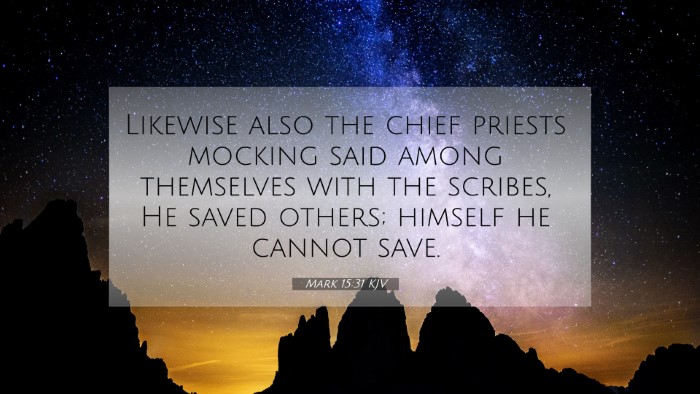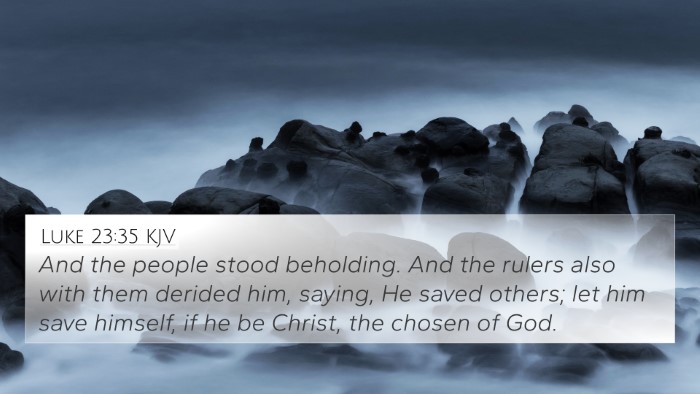Understanding Mark 15:31
Mark 15:31 states: "Likewise also the chief priests mocking said among themselves with the scribes, He saved others; himself he cannot save." This verse encapsulates a moment of deep mockery directed towards Jesus during His crucifixion. The leaders of the Jewish people, who had conspired against Him, ridicule Him for His inability—or perceived unwillingness—to save Himself, despite having performed miracles that saved others.
Context of the Verse
The verse is located within the Passion narrative of Mark, where the focus is on the suffering and humiliation of Jesus. In this context, the mocking highlights the spiritual blindness of the religious leaders and their misunderstanding of Jesus' mission, which was not to save Himself, but to save humanity through His sacrifice.
Commentary Insights
- Matthew Henry: Henry emphasizes that the leaders' mockery was hypocritical, as they were the very ones who rejected His claims to save others. Their derision reveals their own guilt and the inability to grasp the significance of Jesus’ sacrifice.
- Albert Barnes: Barnes notes that this statement exposes the irony and tragic nature of Jesus’ situation. He saved many, yet in the moment of His greatest need, the leaders challenge His power, oblivious to the redemptive purpose behind His suffering.
- Adam Clarke: Clarke reflects on the depth of the ridicule and the fulfillment of prophecy that required the Messiah to suffer. He points out that Jesus' inability to save Himself was a conscious choice, illustrating His love and commitment to fulfilling God’s plan for redemption.
Thematic Connections
The mocking of Jesus in this verse presents key themes in Scripture about belief, salvation, and the identity of Christ. It highlights the contrast between human expectations of a savior and the divine plan for salvation.
Related Bible Verses and Cross-References
- Matthew 27:42: "He saved others; himself he cannot save." This verse echoes the mockery found in Mark, reinforcing the leaders’ misunderstanding of Jesus’ mission.
- Luke 23:35: Similar to Mark, this verse shows the rulers mocking Jesus and emphasizes their lack of faith.
- Isaiah 53:3: Prophecy concerning the suffering servant offers insight into Christ’s rejection and suffering.
- Psalm 22:7-8: This psalm contains prophetic words about the mockery that Jesus faced during His crucifixion.
- John 12:38: This passage cites the disbelief of the people and their failure to recognize Jesus as the Messiah.
- 1 Peter 2:24: This speaks to the purpose of Christ's suffering, emphasizing that He bore our sins in His own body on the tree.
- Philippians 2:7-8: These verses discuss Christ's humility and obedience unto death, highlighting why He did not save Himself.
- Hebrews 12:2: This encourages believers to look unto Jesus, the author and finisher of our faith, who endured the shame of the cross.
- 1 Corinthians 1:23: Paul states that Christ is a stumbling block to the Jews and foolishness to the Gentiles, emphasizing the irony in the leaders' mockery.
- Acts 4:10: Here Peter acknowledges Jesus' resurrection and the work of salvation, contrasting with the mockery in Mark 15:31.
Connecting Themes Through Cross-Referencing
This verse, when analyzed alongside its cross-references, sheds light on several key insights:
- Human Ridicule vs. Divine Purpose: The leaders mock Jesus, not knowing that His inability to save Himself was part of God’s greater plan for humanity’s redemption.
- The Fulfillment of Prophecy: The mockery fulfills Old Testament prophecies about the suffering Messiah, illustrating the continuity between the Testaments.
- Clarification of True Salvation: The mocking emphasizes that saving oneself is contrary to the nature of the Gospel, which is about self-sacrifice for the sake of others.
Tools for Bible Cross-Referencing
To better understand the connections between Bible verses, consider using:
- Bible Concordance: A tool to find keywords and their occurrences throughout Scripture.
- Bible Cross-Reference Guide: Guides that offer thematic links between verses.
- Bible Study Software: Tools available that allow for digital searches and cross-referencing.
- Online Bible Databases: Many websites provide the option to search for thematic connections and verse references.
Conclusion
Mark 15:31 stands as a poignant reminder of the mockery faced by Jesus during His crucifixion and serves as a profound reflection on the nature of His sacrifice. Understanding this verse through the lens of cross-referencing can enhance our spiritual insight and appreciation for the cohesive narrative of the Bible.









